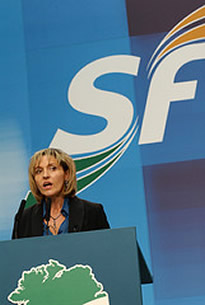Jul 10, 2009 Comments Off on Derry Journal: Seeking the ‘facts’ on the hunger strike
Derry Journal: Seeking the ‘facts’ on the hunger strike
Seeking the ‘facts’ on the hunger strike
Derry Journal
Published Date: 10 July 2009
A chara,
In his most recent letter (Tuesday Journal, 7/7) Donncha McNiallais dismissed my questions as being opinions, rumours and speculation while pushing what he claimed to have occurred as facts.
He tried to push the line that the Brits reneged on an offer made during the first Hunger Strike, going as far as to state; “Secondly, when the first hunger strike was nearing its climax with Sean McKenna close to death, the British made an ‘offer’ through the Mountain Climber. Apparently, this offer amounted to three-and-a-half of the five demands, which sounds familiar.”
How could the Brits renege on an offer never completed? The hunger strike was called off before the offer could be made into a deal.
What actually happened was, at the same time as Brendan Hughes was calling off the hunger strike in order to save Sean McKenna, Father Meagher was delivering a document to Gerry Adams and others at Clonard Monastery from the British government. Adams and the others weren’t happy with what the document contained but they were arranging to have it sent into the prison when they got word that the hunger strike had ended.
When Bobby and the Dark (Hughes] eventually got to see the document after they received it from Father Meagher, it didn’t contain what Donncha stated was ‘apparently three-and-a-half of the five demands’, but stated “The prisoners would have to wear ‘prison-issue clothing’ during week-days, when they were engaged in prison work.” This didn’t even meet the bottom line as far as the five demands went and would have never been enough to end the hunger strike had Brendan Hughes chose to let Sean McKenna die and continue. In fact, Bobby said to Father Meagher, “It wasn’t what we wanted.”
Not only that, but republicans in Clonard with Adams said of the document, “It’s as full of holes as a sieve.” Even Adams said “it wasn’t a document I would have negotiated for.”
Donncha quoted from Denis O’Hearn’s book, yet all of this is in pages 295 to 302 of that book and it can also be found in page 44 of Ten Men Dead; anyone can check this for themselves. I’m surprised Donncha seemingly failed to read the above-mentioned pages as he would’ve seen that all of this meant that the so-called offer from the Brits wasn’t worth the document it was printed on as it contained nothing. How could the Brits renege on nothing, with the hunger strike ended?
There was a major difference between the first hunger strike and the second one at the time of the July 5th offer. Firstly, four men had died and others were following them on hunger strike. Secondly, Bobby had been elected as a MP, while Kieran Doherty and Paddy Agnew had been elected as TDs, thus effectively smashing Thatcher’s criminalisation policy. Then there was the July 4th conciliatory statement from Richard O’Rawe on behalf of the prisoners which pulled back from Political Status and stated that all prisoners could avail of the five demands. It was following this statement that the British government made an offer on July 5th via the Mountain Climber to the IRA.
Since Richard O’Rawe first made his claims, complete denials of any offers changed to ‘no concrete offers’; now with this too totally refuted, especially by Brendan Duddy’s admission that he took a offer to the IRA which they rejected, the guff has all changed to not trusting the Brits! Which of course is true, you can’t trust the Brits; however men were dying and Joe was at death’s door. So why not hold them to their word while making it clear that as soon as the hunger strike ended, if the promised immediate statement from the British was not forthcoming, then those men waiting in line would resume the Hunger Strike within 24 hours?
Of course, there would have been no need for this, as according to Bik in a comm to Adams dated 6.7.81, the ICJP the previous day had told the hunger strikers that they were willing to act as guarantors over any settlement. That was July 5th, the same day the Brits made their offer via the Mountain Climber. The ICJP were unaware of this offer; the following day July 6th Gerry Adams called the ICJP to a safe house in Belfast and told Father Crilly and Hugh Logue about the contact with the British government and that they had been offering them more than had been offered to the ICJP. This was an attempt to encourage the Commission to withdraw.
Surely Adams should have been encouraging them to ensure that the Brits kept their word over any agreed settlement instead of trying to remove them? Why remove those willing to act as guarantors?
Mise le meas,
Thomas Dixie Elliott
 Foyle Sinn Féin MLA has said she is “disgusted” by what she described as republicans exploiting the grief of the families of the hunger strikers to attack her party.
Foyle Sinn Féin MLA has said she is “disgusted” by what she described as republicans exploiting the grief of the families of the hunger strikers to attack her party.
 It has withstood the blows of a million years, and will do so to the end.
It has withstood the blows of a million years, and will do so to the end.